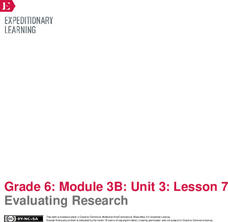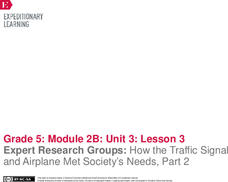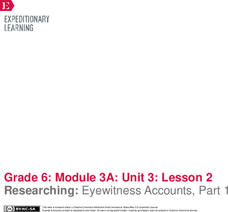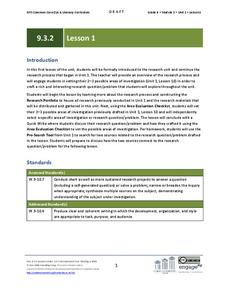EngageNY
Forming a Research-Based Claim: Cascading Consequences Charts
Life is all about choices and consequences. Using a Cascading Consequences chart, scholars create a visual map of the effects of a particular choice or action related to water management. With their researcher's notebooks and copies of...
EngageNY
Researching Facts
How did the 1906 San Francisco earthquake and fire affect the city's inhabitants? Scholars embark on a quest to discover the answer as they work in small groups to research articles about the event. They finish by completing a jigsaw...
EngageNY
Mid-Unit 3 Assessment Part 1: Researching the Destruction Caused by the 1906 San Francisco Earthquake and Fires
How do you interpret that? Scholars work on their mid-unit assessments by interpreting resources pertaining to the 1906 San
Francisco Earthquake and Fires. Readers use the text in their research folders and complete graphic organizers,...
EngageNY
Researching Information about Overfishing
Imagine a world without Nemo and Dory. Using the resource, pupils engage in a jigsaw activity, working in triads to research information about overfishing. They watch a video about overfishing, complete a graphic organizer, read relevant...
EngageNY
Evaluating Research
Calling all archaeologists! Scholars dig through their research about overfishing, searching for the best information to include in their consumer guides. Next, pupils engage in a pair-share activity to discuss their findings with a...
EngageNY
Expert Research Groups: How the Traffic Signal and Airplane Met Society’s Needs, Part 2
Ready, set, act! Using the fun resource, pupils patriciate in a vocabulary charades activity to practice key terms from the unit. Next, scholars work in expert research groups to read an article about the invention of the traffic signal...
K20 LEARN
Unlocking Answers: Keys to Great Research
Successful searches for information require more than just a device with Google access. Young researchers learn how to use keywords and hashtags, as well as how to evaluate sources and how to paraphrase without plagiarizing in a fun...
Scholastic
The Rise of Railroads: Illinois
Railways not only cross the US, but they are also intertwined with the history of America. Using a timeline format, individuals explore the connections between major events in American history—such as the Civil War—and the rise of the...
Elizabeth Murray Project
Colonial Women During the Revolution
Young researchers use the Internet or books to find out about colonial women during the American Revolution. They organize information in a graphic to demonstrate their understanding of the research they gathered before writing a...
EngageNY
Researching: Eyewitness Accounts, Part 1
Time to go on a quote hunt! Because learners cannot interview real eye witnesses for their newspaper articles, they read through text The Great Earthquake and Fires of 1906 looking for quotes to answer their questions. Learners complete...
EngageNY
Comparing Two Main Ideas in an Informational Text: Meg Lowman’s Methods for Researching the Rainforest (Pages 35–36)
Alike or different? Scholars compare and contrast the research methods used by Meg in The Most Beautiful Roof in the World. They record information about her research in a three column note catcher before answering text-dependent...
Curated OER
Plagiarism Workshop
What do George Harrison, Vanilla Ice, and Steven Ambrose all have in common? The Warner Brothers’ films Batman Forever and The Devil’s Advocate? All are guilty of plagiarism. And if you are considering a research project and want to...
EngageNY
Grade 9 ELA Module 3, Unit 2, Lesson 2
Focusing on a specific inquiry and area of investigation, ninth graders continue their research projects and portfolios based on Temple Grandin's Animals in Translation and their questions. The activity guides readers through the...
EngageNY
Grade 9 ELA Module 3, Unit 2, Lesson 1
High schoolers apply sophisticated research skills to an inquiry-based project connected to Temple Grandin's Animals in Translation. Working from the prior unit and the model areas of investigation, including animal intelligence,...
EngageNY
Grade 9 ELA Module 3, Unit 2, Lesson 7
Now that learners have honed their inquiry-based projects down to their strongest few questions, they can conduct independent research. High schoolers pursue answers to their inquiries while assessing sources, establishing a research...
EngageNY
Grade 9 ELA Module 3, Unit 2, Lesson 8
Learning about research can be as important as learning about the topic itself. As ninth graders continue their guided research projects from Temple Grandin's Animals in Translation, they discuss their possible inquiry paths with group...
California Department of Education
My Dream Career
After completing an interest assessment, scholars discover a list of careers that appeal to their interests. They choose one to research and present their findings to their peers.
EngageNY
Grade 9 ELA Module 3, Unit 2, Lesson 9
Part of being a strong researcher is knowing if you're headed in the right direction. Class members study their research frames formulated in the previous lessons of the unit and decide what parts of their inquiry paths need revision or...
K20 Learn
Beyond the Zombie Wars: Understanding Culture
New ReviewThe zombies have invaded! Only a few safe regions remain, and class members must decide where they and the remaining world refugees should flee. After researching the cultures and creating poster presentations of various parts of the...
Novelinks
The House of the Scorpion: Multigenre Research Paper
As the culminating project for a unit study of The House of the Scorpion, class members craft a multi-genre research paper to demonstrate not only their depth of knowledge of a topic of interest to them, but also their understanding of...
EngageNY
Using Effective Search Terms: Researching Water Management
Discover how to use search terms effectively! Scholars continue their exploration of Charles Fishman's The Big Thirst, engaging in a read aloud and then answering text-based questions. Next, pupils learn about using search terms and...
American Chemical Society
Natural Resources and Synthetic Materials
All synthetic materials began as natural materials. An engaging lesson begins with a hands-on activity and an example of the type of research that scholars perform independently. Then pupils receive a topic and begin researching the...
Core Knowledge Foundation
Third Grade Skills Unit 7: What’s in Our Universe?
Over four weeks, third graders participate in lessons that boost spelling, grammar, reading, and writing skills. Scholars explore spelling patterns, suffixes, singular and plural possessive nouns, quotations, and conjunctions....
EngageNY
Forming a Research-Based Claim: Creating Stakeholders Charts
Present the facts. Scholars create presentations of their research on DDT using their Cascading Consequences chart and a
Stakeholders Impacts chart as visuals. They discuss the term stakeholders and create a Stakeholders Impacts chart...
Other popular searches
- Research Tools
- Research Projects
- Research Skills
- Author Research
- Internet Research
- Environment Research Projects
- Country Report
- Research Paper Outline
- Computer Research
- Research Papers
- Research Paper Lesson Plans
- Animal Research

























